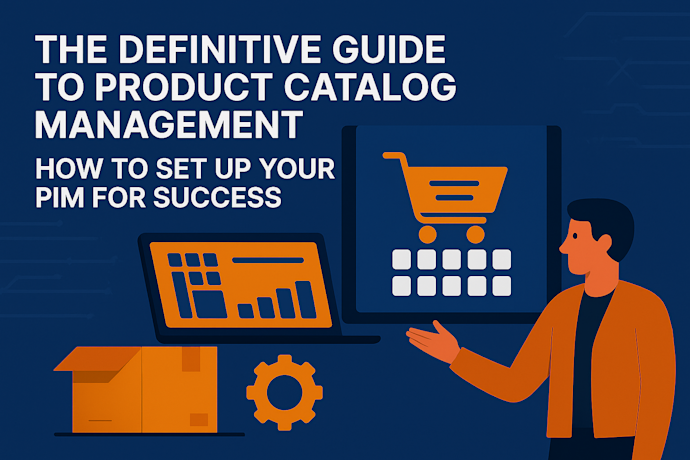
In 2020, ecommerce businesses witnessed an enormous boom in online transactions due to global Covid19 safety regulations. In the next few years, as people continue to make business purchases online, the global B2B ecommerce market size is projected to reach $51.23 trillion by 2030.
Digital Transformation in B2B Ecommerce
The pandemic forced several B2B ecommerce businesses to undergo a rapid digital transformation to incorporate a change in inventory, supply, operations, and product management.
The Impact of the Pandemic
An online presence that attracted customers was deemed crucial, and several retailers pivoted to a digitising their supply chain along with their product information and inventory management systems.
Ongoing Shifts in 2021
In 2021, we expect B2B ecommerce companies to continue along similar lines as they grapple with changing customer expectations, fluctuating market demands, and increased competition. Let’s take a closer look at some trends that will dominate B2B ecommerce in the coming year:
The Rise of the B2B Buyer Experience
Millennial Influence and the Push for B2C-like Journeys
1. Currently, almost half (48.6%) of companies make 50-74% of their corporate purchases online. From seeking information on social media channels, product aggregator websites, and searching for product information on Google to expecting a smooth payment experience through EPOS (Electronic Point-of-Sale) systems, such companies now want a B2C experience when making corporate purchases. Millennials, the first generation to grow up with technology and the ability to buy things online, are the driving force for the increase in the number of B2B ecommerce digital channels. A staggering 93% of buyers currently choose digital channels to make their corporate purchases.
So, how can businesses capture this growing demographic?
The Role of Product Information Across Channels
Businesses need to share the right product information to increase their sales. Customising information for social media posts, website content, print catalogues, and downloadable PDFs can make a significant difference in appealing to prospective customers.
Valid, up-to-date and consistent product information across different digital channels in the form of metadata (on search engines), images, videos, product descriptions (on websites), digital catalogues, increase credibility and visibility.
Personalisation and Data-Driven Engagement
Buyers Want Control and Personalisation
2. While B2B customers prefer total control when making their purchases, they are also very keen on personalised products and services. Offering recommendations based on their needs to help them make better decisions is also an integral aspect of ensuring higher sales.
Reducing Sales Calls and Increasing Relevance
But the conundrum lies in the fact that more than half the buyers (59%) are now put off by sales calls — how then are B2B businesses to recommend their best products and services?
B2B ecommerce companies will have to ensure that the content they put out to attract their prospective customers is capable of converting leads into sales and sharing the right information. Almost half the B2B customers are likely to spend more when presented with personalised offerings while irrelevant content will Businesses that use product data to provide an enriching customer experience will leave a lasting impression on the consumers’ minds.
Using PIM Systems to Deliver Richer Experiences
Employing tools like PIM systems can help B2B ecommerce companies navigate and manage large amounts of product information.
The Growth of B2B Marketplaces
Online Marketplaces as Preferred Sales Channels
2. Most people making corporate purchases now expect a B2C experience, including the ability to shop for the best product on an online marketplace. In fact, 87% of all business buyers, across all age ranges, make their business purchases through online marketplaces. B2B marketplaces are expected to become the next billion-dollar ecommerce startups.
Before the Covid19 pandemic, B2B marketplaces were projected to hit $3.6 trillion in sales by 2024 up from $680 billion in 2018. Now, research shows that 20% of purchasing managers spend more on marketplaces, and 22% spent significantly more during the pandemic.
How will these corporate buyers use marketplaces in 2021?
Product Listings and Information as Conversion Drivers
Customers will search on Google (or their preferred search engine) as well as on individual marketplaces to choose the right product/service for their needs. The product information on each listing is what will direct them to purchase. Similarly, companies with their own marketplace will need to clearly list their available products, services to ensure the product information is displayed optimally on the relevant digital channel.
The Role of PIM in 2021 and Beyond
Why Manufacturers and Wholesalers Are Adopting PIM
B2B ecommerce companies are expected to continue on the path of digital transformation in 2021. Several manufacturers and wholesalers will incorporate PIM systems (like Pimcore) to better manage and disseminate their product data through a centralised product information database.
Learn More: Download Our Whitepaper
To know more about how Pim systems can help you reach and convert more B2B customers, please download our whitepaper here.


